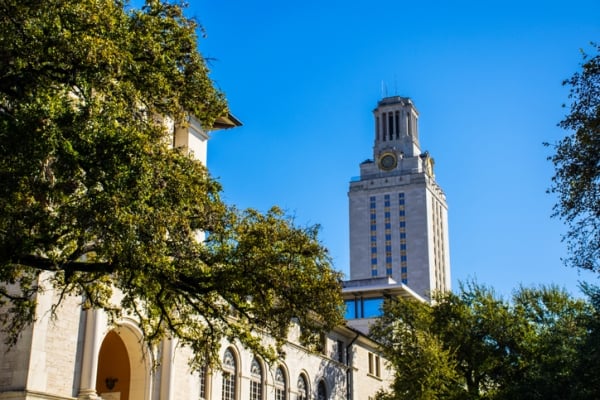
UT Austin Muzzles Grad Student Assembly’s Political Speech
The Graduate Student Assembly had planned to consider resolutions against two Texas laws.
Officials at the University of Texas at Austin blocked the Graduate Student Assembly from considering two resolutions against Texas state laws last week, arguing that the student-run body must follow institutional neutrality policies.
Mateo Vallejo, a first-year master’s student and representative in the GSA for the School of Social Work, drafted two resolutions for the assembly to consider: one condemning Texas SB 17, which bans diversity, equity and inclusion initiatives at Texas public institutions, and another against Texas SB 37, a state law that, among other changes, put faculty senates at public institutions under the control of university presidents and boards.
On Oct. 10, GSA president David Spicer submitted the two resolutions to Associate Dean for Graduate Studies Christopher J. McCarthy for approval. According to the assembly bylaws, the dean of students’ office must approve all proposed GSA legislation before it can be considered by the full assembly, effectively giving the office an opportunity to veto, Vallejo explained. Once a bill is submitted to the dean’s office, the assembly cannot make any changes to the text. Vallejo, Spicer and the GSA vice president were careful to follow the bylaws during the drafting process to give administrators as little reason as possible to shut the resolutions down.
Five days later, McCarthy nixed them.
“[Vice President for Legal Affairs] considers the legislation to be political speech that is not permitted to be issued by a sponsored student organization in their official capacity,” McCarthy wrote in an email to Spicer, which Inside Higher Ed obtained. “This legislation should not be permitted to go forward.”
Spicer followed up, asking why the GSA was prohibited from engaging in political speech when others have done so in their official capacity at UT Austin. He pointed to an op-ed by Provost William Inboden in the conservative magazine National Affairs and a statement from University of Texas System Board of Regents chairman Kevin P. Eltife, who said the university was “honored” to be among the institutions “selected by the Trump Administration for potential funding advantages” under Trump’s “Compact for Academic Excellence in Higher Education.”
“Their speech was on ‘political and social’ matters, so I do not know how they escape the neutrality requirement whereas GSA cannot,” Spicer wrote in his response to McCarthy. In addition, UT Austin’s undergraduate student government recently put out a statement of support for the university’s new president, Jim Davis, which Spicer argued is also political speech.
“Like attacks on the Faculty Council, silencing GSA through institutional neutrality is an attack on the notion of shared governance,” Spicer said in a statement to Inside Higher Ed. “GSA appoints students to university-wide committees and, previously, Faculty Council committees. GSA is the one space at UT Austin where students can voice issues impacting their graduate education.”
When asked about the double standard, UT Austin spokesperson Mike Rosen told Inside Higher Ed that the resolution in support of Davis is not political speech because he was appointed by a nonpartisan board and not by an elected official. Members of the University of Texas System Board of Regents are appointed by the Texas governor.
“UT Austin exercises institutional neutrality consistent with a policy approved by the UT System Board of Regents, which prohibits System institutions from expressing positions on political matters or issues of the day. As a sponsored student organization, GSA acts as an extension of the University and cannot act to cause the University to violate the UT System policy,” Rosen wrote in an email.
Vallejo’s resolutions against SB 17 and SB 37 would not be the first attempt by the GSA to address Texas politics. In 2022, the Assembly passed a resolution in response to Texas attorney general Ken Paxton’s opinion and Gov. Greg Abbott’s directive to the Department of Family and Protective Services that gender-affirming medical care for minors could be treated as child abuse. In its resolution, the Assembly urged campus officials not to adopt that definition for campus reporting purposes.

Source link


